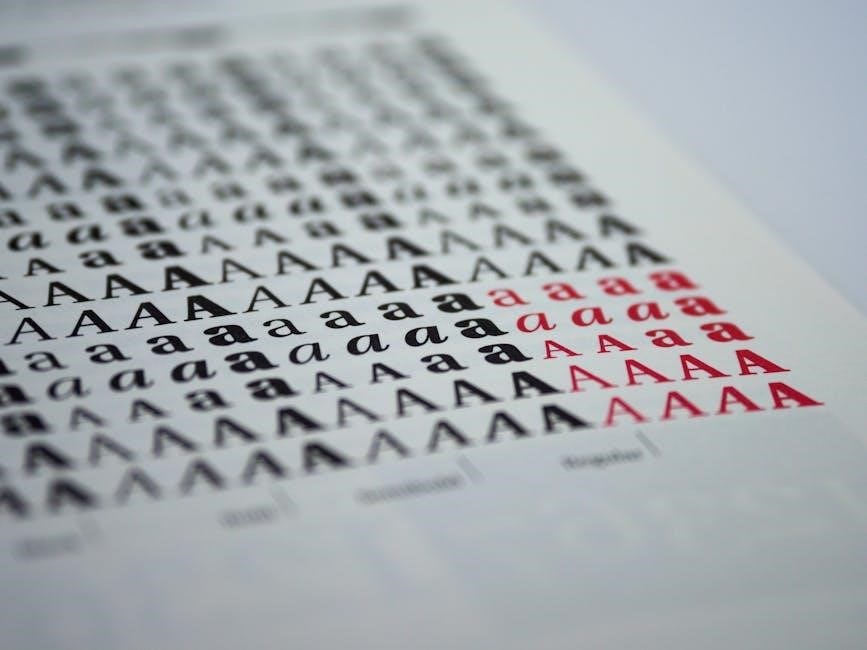A query letter is a crucial tool for authors seeking publication, offering a concise pitch of their work to agents or publishers. It typically includes a manuscript synopsis, author bio, and reasons why the work aligns with the recipient’s interests. Examples from famous authors provide inspiration and guidance for crafting effective query letters.
What is a Query Letter?
A query letter is a professional submission tool used by authors to pitch their manuscripts to literary agents or publishers. It serves as a concise introduction to the author and their work, typically including a brief synopsis of the manuscript, the author’s bio, and a compelling reason why the work aligns with the agent’s or publisher’s interests. The letter aims to capture the recipient’s attention and persuade them to request the full manuscript. It is usually one page in length and follows specific formatting guidelines to ensure professionalism and clarity. A well-crafted query letter is essential for making a strong first impression in the competitive publishing industry. By highlighting the manuscript’s unique qualities and the author’s credentials, it acts as a gateway to potential representation and publication opportunities.
The Purpose of a Query Letter

The primary purpose of a query letter is to capture the interest of literary agents or publishers, compelling them to request the full manuscript. It acts as a professional introduction, showcasing the author’s work and credentials in a concise manner. By highlighting the manuscript’s unique qualities, such as its genre, target audience, and market potential, the query letter aims to demonstrate why the work is a good fit for the recipient. Additionally, it serves to establish a connection between the author and the agent or publisher, expressing enthusiasm for potential collaboration. A well-crafted query letter not only presents the manuscript but also positions the author as a professional and dedicated writer, increasing the likelihood of securing representation or publication opportunities.

Structure of a Query Letter
A query letter is structured to include contact information, the agent’s details, a salutation, a compelling pitch, an author bio, a thank you, and a signature. These elements ensure clarity and professionalism;
Contact Information
Your contact information should be clearly displayed at the top of the query letter. This includes your name, address, phone number, and email. Use a professional font and ensure all details are accurate. Including a website or social media link can also be beneficial, especially if you have an online portfolio or presence. Proper formatting is essential to make a good first impression. Ensure your contact information is easy to read and locate. This section sets the tone for the rest of the letter, so attention to detail is crucial. Always double-check for any typos or errors before sending. A polished presentation reflects professionalism and seriousness about your work. Make sure to align your contact information to the left or center for a clean look. Avoid using overly decorative fonts that may distract from the content. Keep it simple, clear, and professional.

Agent’s or Publisher’s Information
Begin your query letter by addressing the agent or publisher by name, ensuring the spelling is correct. Include their agency or publishing house name, along with the full mailing address. This demonstrates that you have researched and targeted the right professional for your work. Personalizing the salutation shows respect and attention to detail. Avoid generic greetings like “To Whom It May Concern,” as they can make your query seem less thoughtful. If submitting electronically, include the agent’s email address and any specific submission guidelines they require. Double-check the agent’s contact information to prevent errors. This section establishes a professional tone and shows that you are serious about their consideration. Properly formatting this information is vital for making a positive first impression. Keep it concise and accurate to ensure clarity. This step sets the stage for the rest of your query letter, highlighting your professionalism and preparedness. Accuracy here is key to ensuring your letter reaches the intended recipient without delays. Always follow the submission guidelines provided by the agent or publisher to increase your chances of a positive response. By personalizing this section, you show that you have taken the time to research and understand their specific interests and preferences. This personalized approach can make your query stand out in a crowded market. Additionally, ensuring that the agent’s or publisher’s information is up-to-date is crucial, as agencies often experience changes in staffing and focus areas. Using outdated information can lead to your query being overlooked or dismissed. Therefore, it is essential to verify the details before sending your letter. This attention to detail not only reflects your professionalism but also your commitment to presenting your work in the best possible light. By taking the time to accurately include the agent’s or publisher’s information, you demonstrate respect for their time and consideration. This thoughtful approach can significantly enhance your chances of securing a positive response and moving forward in the publication process. Remember, the goal is to make a strong, professional impression from the very first line of your query letter.
Salutation
The salutation is the opening greeting of your query letter, typically beginning with “Dear [Agent’s Name]” or “Dear [Publisher’s Name].” It’s essential to address the recipient by their correct name and title, such as Mr., Ms., Mrs., or Dr., to show professionalism and respect. Avoid using generic salutations like “To Whom It May Concern,” as they can make your query seem impersonal. If you’re unsure of the agent’s gender or title, it’s acceptable to use their full name without a prefix. Always verify the spelling of the recipient’s name and ensure their contact information is up-to-date. A well-crafted salutation sets a positive tone and demonstrates your attention to detail and professionalism. Personalizing the greeting shows that you’ve researched the agent or publisher and are genuinely interested in working with them. This thoughtful approach can help your query stand out and make a strong first impression. By addressing the recipient correctly, you convey respect and increase the likelihood of your query being taken seriously. Additionally, adhering to any specific submission guidelines provided by the agent or publisher can further enhance the professionalism of your query letter. A polished and accurate salutation is the first step in making a favorable impression and demonstrates your commitment to presenting your work in the best possible light. This attention to detail reflects positively on your professionalism and dedication to securing representation or publication. Therefore, taking the time to craft a proper salutation is crucial for the success of your query letter. By following these guidelines, you can ensure that your salutation is both respectful and effective, setting the stage for a compelling and professional query letter.
The Pitch

The pitch is the heart of your query letter, providing a concise and engaging summary of your manuscript. It should include the genre, word count, and target audience, followed by a brief synopsis that highlights the story’s unique elements. The pitch should capture the essence of your book, introducing the main characters, conflict, and stakes without revealing the ending. Use compelling language to convey the tone and style of your writing. Include comparative titles to help the agent understand your book’s market position. Personalize the pitch by explaining why your book aligns with the agent’s interests or catalog. Keep your pitch clear, focused, and free of overly complex language. Avoid clichés and ensure every sentence serves a purpose. A strong, well-crafted pitch can make your query letter stand out and increase the likelihood of securing representation or publication.
Author Bio
The author bio section in a query letter is a brief opportunity to showcase your credibility and connection to the work. It should be concise, professional, and relevant to your writing. Mention any prior writing experience, such as published works, awards, or relevant professional backgrounds. If you’re a debut author, highlight any writing-related achievements or memberships in writing organizations. Avoid listing unrelated jobs or personal details unless they add unique value to your narrative. Tailor the bio to reflect your expertise in the genre or subject matter of your book. Keep it focused and avoid exaggeration. The goal is to establish trust and credibility with the agent or publisher, showing that you are a serious and capable writer. Your bio should complement the pitch and leave a lasting impression. Keep it to one or two sentences for clarity and impact. Avoid unnecessary embellishments; Ensure it aligns with the tone and style of your query letter. Highlight any unique qualifications or perspectives that make you the best person to tell your story. Always maintain professionalism and modesty. Your bio should not overshadow the pitch but rather support it by reinforcing your authority on the subject. Use this section to build a connection with the reader and demonstrate your commitment to your craft. Always proofread your bio for clarity and grammar. A well-written bio can enhance your query letter’s effectiveness. Avoid including personal anecdotes or unrelated hobbies. Focus solely on your writing credentials and experiences. If you lack formal credentials, emphasize your passion for storytelling and dedication to honing your craft. A strong bio can make you stand out as a credible and compelling author. Never include negative statements or self-doubt. Keep it positive and forward-looking. The bio should leave the agent or publisher with a clear understanding of your qualifications and enthusiasm for your work. Always ensure that the bio is tailored to the specific agent or publisher you are querying. Avoid generic statements and instead, highlight what makes you unique. Use active language to convey confidence and professionalism. A well-crafted author bio can elevate your query letter and increase your chances of success. It is essential to strike the right balance between humility and confidence. Your bio should reflect your voice and style, mirroring the tone of your writing. Avoid jargon or overly complex language. Keep it accessible and engaging. If you have a strong online presence or social media following, mention it briefly. Highlight any relevant education or training in writing. If you have worked with mentors or writing coaches, mention their names if they are well-known. Avoid listing family members or friends as references unless they are established in the industry. Always prioritize professionalism and relevance. The bio should never feel forced or artificial. It should feel like a natural extension of your query letter. A strong author bio can make a lasting impression and help you stand out in a competitive market. Always keep it concise, focused, and relevant. Avoid repetition and ensure that every word adds value. Your bio should complement your pitch and reinforce your credibility as a writer. Tailor it to the specific agent or publisher, showing that you have done your research and understand their interests. Highlight your unique perspective and what sets you apart from other writers. Use specific examples to illustrate your qualifications. Avoid vague statements and instead, provide concrete details. If you have a platform or audience, mention it briefly. Highlight any relevant awards or recognition you have received. If you are part of a writing community or group, mention it to show your involvement in the writing world. Always keep the tone professional and confident. Avoid humor or casual language unless it aligns with your genre. A well-written bio can enhance your query letter’s professionalism and appeal. Always proofread your bio for clarity and grammar. Ensure it is free of errors and flows smoothly. A strong author bio can make a significant difference in the effectiveness of your query letter. It should be clear, concise, and compelling, leaving a lasting impression on the agent or publisher. Avoid including unnecessary details that do not add value to your credibility as a writer. Focus on what makes you unique and qualified to tell your story. Use this section to build trust and establish a connection with the reader. Always maintain a professional tone and avoid distractions. Your bio should support your pitch and reinforce your credibility. Keep it focused, relevant, and concise. Avoid repetition and ensure that every sentence adds value; A well-crafted author bio can elevate your query letter and increase your chances of success. Always tailor it to the specific agent or publisher, showing that you have done your research and understand their interests. Highlight your unique qualifications and what makes you the best person to tell your story. Use specific examples to illustrate your expertise and connection to the genre or subject matter. Avoid vague statements and instead, provide concrete details. If you have a strong platform or audience, mention it briefly. Highlight any relevant awards or recognition you have received. If you are part of a writing community or group, mention it to show your involvement in the writing world. Always keep the tone professional and confident. Avoid humor or casual language unless it aligns with your genre. A well-written bio can enhance your query letter’s professionalism and appeal. Always proofread your bio for clarity and grammar. Ensure it is free of errors and flows smoothly. A strong author bio can make a significant difference in the effectiveness of your query letter. It should be clear, concise, and compelling, leaving a lasting impression on the agent or publisher. Avoid including unnecessary details that do not add value to your credibility as a writer. Focus on what makes you unique and qualified to tell your story. Use this section to build trust and establish a connection with the reader. Always maintain a professional tone and avoid distractions. Your bio should support your pitch and reinforce your credibility. Keep it focused, relevant, and concise. Avoid repetition and ensure that every sentence adds value. A well-crafted author bio can elevate your query letter and increase your chances of success. Always tailor it to the specific agent or publisher, showing that you have done your research and understand their interests. Highlight your unique qualifications and what makes you the best person to tell your story. Use specific examples to illustrate your expertise and connection to the genre or subject matter. Avoid vague statements and instead, provide concrete details. If you have a strong platform or audience, mention it briefly. Highlight any relevant awards or recognition you have received. If you are part of a writing community or group, mention it to show your involvement in the writing world. Always keep the tone professional and confident. Avoid humor or casual language unless it aligns with your genre. A well-written bio can enhance your query letter’s professionalism and appeal. Always proofread your bio for clarity and grammar. Ensure it is free of errors and flows smoothly. A strong author bio can make a significant difference in the effectiveness of your query letter. It should be clear, concise, and compelling, leaving a lasting impression on the agent or publisher. Avoid including unnecessary details that do not add value to your credibility as a writer. Focus on what makes you unique and qualified to tell your story. Use this section to build trust and establish a connection with the reader. Always maintain a professional tone and avoid distractions. Your bio should support your pitch and reinforce your credibility. Keep it focused, relevant, and concise. Avoid repetition and ensure that every sentence adds value. A well-crafted author bio can elevate your query letter and increase your chances of success. Always tailor it to the specific agent or publisher, showing that you have done your research and understand their interests. Highlight your unique qualifications and what makes you the best person to tell your story. Use specific examples to illustrate your expertise and connection to the genre or subject matter. Avoid vague statements and instead, provide concrete details. If you have a strong platform or audience, mention it briefly. Highlight any relevant awards or recognition you have received. If you are part of a writing community or group, mention it to show your involvement in the writing world. Always keep the tone professional and confident. Avoid humor or casual language unless it aligns with your genre. A well-written bio can enhance your query letter’s professionalism and appeal. Always proofread your bio for clarity and grammar. Ensure it is free of errors and flows smoothly. A strong author bio can make a significant difference in the effectiveness of your query letter. It should be clear, concise, and compelling, leaving a lasting impression on the agent or publisher. Avoid including unnecessary details that do not add value to your credibility as a writer. Focus on what makes you unique and qualified to tell your story. Use this section to build trust and establish a connection with the reader. Always maintain a professional tone and avoid distractions. Your bio should support your pitch and reinforce your credibility. Keep it focused, relevant, and concise. Avoid repetition and ensure that every sentence adds value. A well-crafted author bio can elevate your query letter and increase your chances of success. Always tailor it to the specific agent or publisher, showing that you have done your research and understand their interests. Highlight your unique qualifications and what makes you the best person to tell your story. Use specific examples to illustrate your expertise and connection to the genre or subject matter. Avoid vague statements and instead, provide concrete details. If you have a strong platform or audience, mention it briefly. Highlight any relevant awards or recognition you have received. If you are part of a writing community or group, mention it to show your involvement in the writing world. Always keep the tone professional and confident. Avoid humor or casual language unless it aligns with your genre. A well-written bio can enhance your query letter’s professionalism and appeal. Always proofread your bio for clarity and grammar. Ensure it is free of errors and flows smoothly. A strong author bio can make a significant difference in the effectiveness of your query letter. It should be clear, concise, and compelling, leaving a lasting impression on the agent or publisher. Avoid including unnecessary details that do not add value to your credibility as a writer. Focus on what makes you unique and qualified to tell your story. Use this section to build trust and establish a connection with the reader. Always maintain a professional tone
Thank You and Closing
The closing section of a query letter is your final opportunity to leave a positive impression. Begin with a polite thank you, expressing gratitude for the agent’s time and consideration. Acknowledge the effort they put into reviewing submissions. Reiterate your enthusiasm for the opportunity to work with them and express confidence in your work’s potential. Avoid overly aggressive language or demands for a response. Instead, maintain professionalism and humility. Include a brief statement about looking forward to the possibility of discussing your work further. End with a polite sign-off, such as “Thank you again for your time and consideration,” followed by your full name and contact information. This section should be concise, courteous, and reflective of your professionalism. Keep it focused on gratitude and anticipation, avoiding any pressure or assumptions. Your closing should leave the agent with a positive final impression of you and your work. Always ensure it aligns with the tone of the rest of your query letter. A well-crafted closing can reinforce your credibility and politeness, making your query letter more memorable. Avoid repetition and ensure it flows naturally from the preceding sections. Your closing should be brief but sincere, leaving the agent with a sense of appreciation and respect. Always double-check for grammar and clarity to maintain professionalism. A polished closing can enhance the overall effectiveness of your query letter. It should feel like a natural conclusion to your pitch, reinforcing your enthusiasm and gratitude. Avoid introducing new information or making last-minute pleas. Instead, focus on wrapping up the letter gracefully. Your closing should leave the agent feeling appreciated and intrigued by your work. Always maintain a respectful and professional tone, as this is your final chance to make a positive impression. Ensure that your contact information is clear and easy to read. A well-written closing can leave a lasting positive impression and increase your chances of a favorable response. Always keep it concise, polite, and professional. Avoid overly emotional language or excessive flattery. Instead, strike a balance between gratitude and confidence. Your closing should reflect your respect for the agent’s time and expertise. Always proofread this section carefully to avoid errors. A polished closing can elevate your query letter and leave a lasting impression on the agent. It should be a fitting conclusion to your pitch, reinforcing your professionalism and enthusiasm. Avoid any negative statements or doubts. Instead, focus on positivity and confidence. Your closing should leave the agent with a clear understanding of your gratitude and eagerness to collaborate. Always maintain a professional tone and avoid casual language. A well-crafted closing can make your query letter stand out and increase your chances of success. Always tailor it to the specific agent or publisher, showing that you have done your research and understand their interests. Highlight your enthusiasm for the opportunity and your respect for their expertise. Use this section to reinforce your credibility and leave a lasting impression. Always keep it concise, focused, and professional. Avoid repetition and ensure that every word adds value. A well-written closing can enhance your query letter’s effectiveness and increase your chances of a positive response. Always ensure it is free of errors and flows smoothly. A strong closing can make a significant difference in the overall impact of your query letter. It should be clear, concise, and compelling, leaving the agent with a positive final impression. Avoid including unnecessary details that do not add value to your credibility as a writer. Focus on what makes you unique and qualified to tell your story. Use this section to build trust and establish a connection with the reader. Always maintain a professional tone and avoid distractions. Your closing should support your pitch and reinforce your credibility. Keep it focused, relevant, and concise. Avoid repetition and ensure that every sentence adds value. A well-crafted closing can elevate your query letter and increase your chances of success. Always tailor it to the specific agent or publisher, showing that you have done your research and understand their interests. Highlight your unique qualifications and what makes you the best person to tell your story. Use specific examples to illustrate your expertise and connection to the genre or subject matter. Avoid vague statements and instead, provide concrete details. If you have a strong platform or audience, mention it briefly. Highlight any relevant awards or recognition you have received. If you are part of a writing community or group, mention it to show your involvement in the writing world. Always keep the tone professional and confident. Avoid humor or casual language unless it aligns with your genre. A well-written closing can enhance your query letter’s professionalism and appeal. Always proofread your closing for clarity and grammar. Ensure it is free of errors and flows smoothly. A strong closing can make a significant difference in the effectiveness of your query letter. It should be clear, concise, and compelling, leaving a lasting impression on the agent or publisher. Avoid including unnecessary details that do not add value to your credibility as a writer. Focus on what makes you unique and qualified to tell your story. Use this section to build trust and establish a connection with the reader. Always maintain a professional tone and avoid distractions. Your closing should support your pitch and reinforce your credibility. Keep it focused, relevant, and concise. Avoid repetition and ensure that every sentence adds value. A well-crafted closing can elevate your query letter and increase your chances of success. Always tailor it to the specific agent or publisher, showing that you have done your research and understand their interests. Highlight your unique qualifications and what makes you the best person to tell your story; Use specific examples to illustrate your expertise and connection to the genre or subject matter. Avoid vague statements and instead, provide concrete details. If you have a strong platform or audience, mention it briefly. Highlight any relevant awards or recognition you have received. If you are part of a writing community or group, mention it to show your involvement in the writing world. Always keep the tone professional and confident. Avoid humor or casual language unless it aligns with your genre. A well-written closing can enhance your query letter’s professionalism and appeal. Always proofread your closing for clarity and grammar. Ensure it is free of errors and flows smoothly. A strong closing can make a significant difference in the effectiveness of your query letter. It should be clear, concise, and compelling, leaving a lasting impression on the agent or publisher. Avoid including unnecessary details that do not add value to your credibility as a writer. Focus on what makes you unique and qualified to tell your story. Use this section to build trust and establish a connection with the reader. Always maintain a professional tone and avoid distractions. Your closing should support your pitch and reinforce your credibility. Keep it focused, relevant, and concise. Avoid repetition and ensure that every sentence adds value. A well-crafted closing can elevate your query letter and increase your chances of success. Always tailor it to the specific agent or publisher, showing that you have done your research and understand their interests. Highlight your unique qualifications and what makes you the best person to tell your story. Use specific examples to illustrate your expertise and connection to the genre or subject matter. Avoid vague statements and instead, provide concrete details. If you have a strong platform or audience, mention it briefly. Highlight any relevant awards or recognition you have received. If you are part of a writing community or group, mention it to show your involvement in the writing world. Always keep the tone professional and confident. Avoid humor or casual language unless it aligns with your genre. A well-written closing can enhance your query letter’s professionalism and appeal. Always proofread your closing for clarity and grammar. Ensure it is free of errors and flows smoothly. A strong closing can make a significant difference in the effectiveness of your query letter. It should be clear, concise, and compelling, leaving a lasting impression on the agent or publisher. Avoid including unnecessary details that do not add value to your credibility as a writer. Focus on what makes you unique and qualified to tell your story. Use this section to build trust and establish a connection with the reader. Always maintain a professional tone and avoid distractions. Your closing should support your pitch and reinforce your credibility. Keep it focused, relevant, and concise. Avoid repetition and ensure that every sentence adds value. A well-crafted closing can elevate your query letter and increase your chances of success. Always tailor it to the specific agent or publisher, showing that you have done your research and understand their interests. Highlight your unique qualifications and what makes you the best person to tell your story. Use specific examples to illustrate your expertise and connection to the genre or subject matter. Avoid vague statements and instead, provide concrete details. If you have a strong platform or audience, mention it briefly

Resources for Query Letter Writing
Signature

The signature section is the final element of a query letter, providing a professional and personal touch. It typically includes your full name, printed clearly above your typed name, ensuring readability. Below your name, list your contact information, such as your phone number, email address, and mailing address. This ensures agents or publishers can easily reach you. If you have a professional website or social media profiles, you may include these as well. Maintain a professional tone and avoid overly decorative fonts or styles. Ensure your contact information is current and accurate. For digital submissions, consider including a scanned signature or a professional-looking digital sign-off. Always proofread your signature section for clarity and correctness. A polished signature reinforces your professionalism and leaves a lasting impression. Keep it simple, clear, and aligned with the tone of your query letter. Avoid adding unnecessary details or distractions. Your signature should be the final touch that reinforces your credibility and makes it easy for agents to contact you. Ensure it is neatly formatted and free of errors, reflecting the professionalism you’ve maintained throughout the letter. A well-crafted signature section completes your query letter effectively. Always double-check your contact information for accuracy and ensure it is easy to read. A professional signature enhances the overall presentation of your query letter and supports your chances of making a positive impression. Avoid using unprofessional email addresses or overly casual language. Instead, maintain a respectful and professional tone. Your signature should align with the rest of your query letter in style and formatting. Ensure it is concise and focused on providing essential contact details. Avoid including unnecessary information that does not contribute to your professional image. Your signature should be the final step in presenting yourself as a credible and approachable author. Always ensure it is polished and error-free, leaving a lasting positive impression on the agent or publisher. A well-executed signature section is the perfect conclusion to your query letter, reinforcing your professionalism and making it easy for industry professionals to connect with you. Always tailor it to the specific submission guidelines and maintain consistency with the rest of your letter. Avoid repetition and ensure every element adds value. A professional signature section is essential for completing your query letter effectively and increasing your chances of success. Always prioritize clarity, accuracy, and professionalism in this final section. Your signature should be a fitting conclusion to your query letter, leaving a lasting impression of your credibility and enthusiasm for your work. Ensure it is neatly formatted and free of errors, reflecting the care and attention you’ve invested in your query letter. A polished signature section can elevate your query letter and leave a lasting positive impression on agents or publishers. Always maintain a professional tone and avoid distractions. Your signature should support your pitch and reinforce your credibility. Keep it focused, relevant, and concise. Avoid repetition and ensure that every word adds value. A well-crafted signature section can enhance your query letter’s effectiveness and increase your chances of success. Always tailor it to the specific agent or publisher, showing that you have done your research and understand their interests. Highlight your unique qualifications and what makes you the best person to tell your story. Use specific examples to illustrate your expertise and connection to the genre or subject matter. Avoid vague statements and instead, provide concrete details. If you have a strong platform or audience, mention it briefly. Highlight any relevant awards or recognition you have received. If you are part of a writing community or group, mention it to show your involvement in the writing world. Always keep the tone professional and confident. Avoid humor or casual language unless it aligns with your genre. A well-written signature can enhance your query letter’s professionalism and appeal. Always proofread your signature for clarity and grammar. Ensure it is free of errors and flows smoothly. A strong signature can make a significant difference in the effectiveness of your query letter. It should be clear, concise, and compelling, leaving a lasting impression on the agent or publisher. Avoid including unnecessary details that do not add value to your credibility as a writer. Focus on what makes you unique and qualified to tell your story. Use this section to build trust and establish a connection with the reader. Always maintain a professional tone and avoid distractions. Your signature should support your pitch and reinforce your credibility. Keep it focused, relevant, and concise. Avoid repetition and ensure that every sentence adds value. A well-crafted signature can elevate your query letter and increase your chances of success. Always tailor it to the specific agent or publisher, showing that you have done your research and understand their interests. Highlight your unique qualifications and what makes you the best person to tell your story. Use specific examples to illustrate your expertise and connection to the genre or subject matter. Avoid vague statements and instead, provide concrete details. If you have a strong platform or audience, mention it briefly. Highlight any relevant awards or recognition you have received. If you are part of a writing community or group, mention it to show your involvement in the writing world. Always keep the tone professional and confident. Avoid humor or casual language unless it aligns with your genre. A well-written signature can enhance your query letter’s professionalism and appeal. Always proofread your signature for clarity and grammar. Ensure it is free of errors and flows smoothly. A strong signature can make a significant difference in the effectiveness of your query letter. It should be clear, concise, and compelling, leaving a lasting impression on the agent or publisher. Avoid including unnecessary details that do not add value to your credibility as a writer. Focus on what makes you unique and qualified to tell your story. Use this section to build trust and establish a connection with the reader. Always maintain a professional tone and avoid distractions. Your signature should support your pitch and reinforce your credibility. Keep it focused, relevant, and concise. Avoid repetition and ensure that every sentence adds value. A well-crafted signature can elevate your query letter and increase your chances of success. Always tailor it to the specific agent or publisher, showing that you have done your research and understand their interests. Highlight your unique qualifications and what makes you the best person to tell your story. Use specific examples to illustrate your expertise and connection to the genre or subject matter. Avoid vague statements and instead, provide concrete details. If you have a strong platform or audience, mention it briefly. Highlight any relevant awards or recognition you have received. If you are part of a writing community or group, mention it to show your involvement in the writing world. Always keep the tone professional and confident. Avoid humor or casual language unless it aligns with your genre. A well-written signature can enhance your query letter’s professionalism and appeal. Always proofread your signature for clarity and grammar. Ensure it is free of errors and flows smoothly. A strong signature can make a significant difference in the effectiveness of your query letter. It should be clear, concise, and compelling, leaving a lasting impression on the

